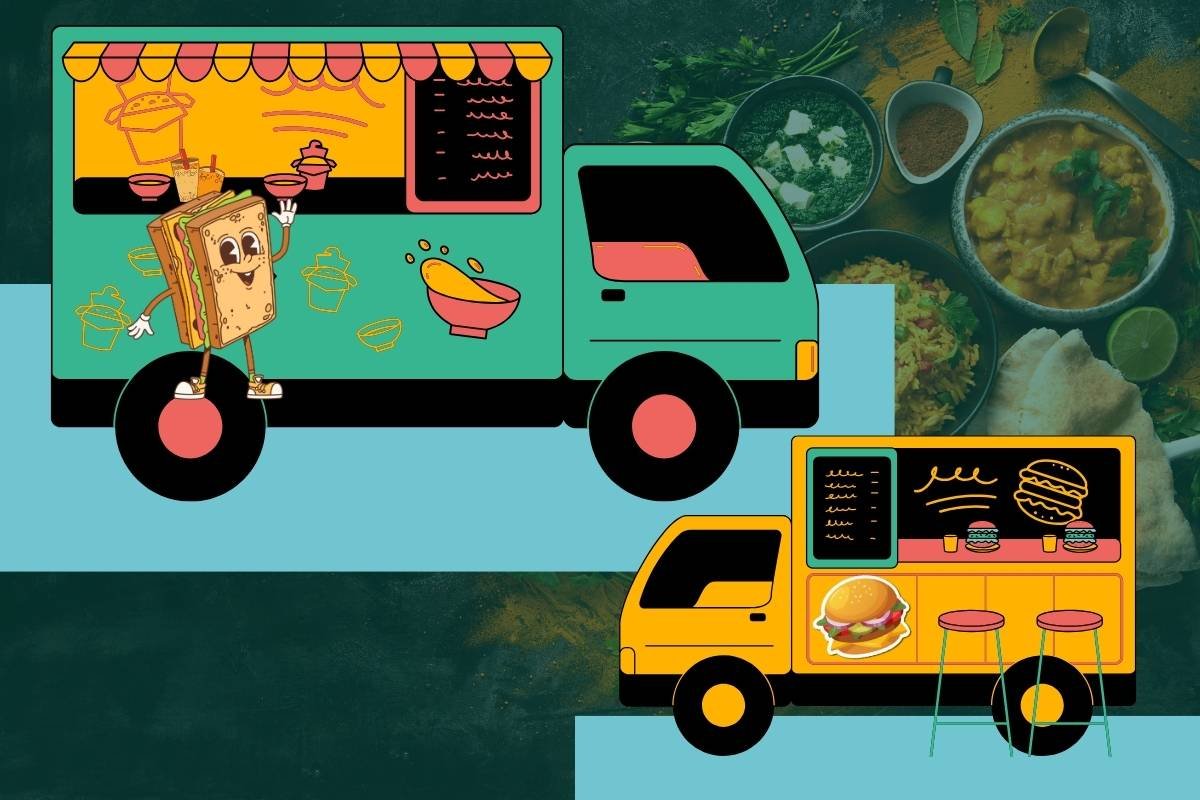The food truck industry has grown into a thriving business opportunity over the last few years. With lower startup costs than traditional restaurants and the flexibility to move locations, many entrepreneurs are asking: Are food trucks profitable?
The short answer is yes, but success depends on several factors, including location, menu, and operations.
In this article, we will understand how much food trucks make, average profit margins, and the elements that can either fuel your growth or slow you down.
Are Food Trucks Profitable? Let’s Break the Myth
Many entrepreneurs jump into the food truck business expecting fast cash flow, flexible work hours, and lower risks than restaurants. But are food trucks profitable just because of lower startup costs? Not always. Let’s find lesser-known aspects of profitability in the food truck industry that are frequently missed.
1. Profitability Depends on the Business Model, Not Just Sales
A major misconception is that more customers = more profit. But many profitable food trucks make less than others in sales but more in net earnings. How?
- Low-waste model: Some food trucks offer limited daily menus to avoid overbuying and food waste.
- Pre-order system: Allowing customers to pre-book meals reduces unsold food.
- Subscription model: Offering weekly meal plans for offices or neighborhoods adds predictable income.
- Collaboration with breweries or events: Profit-sharing deals reduce overhead.
Insight: A taco truck earning $15K/month but spending only $5K may be more profitable than a truck making $30K/month but spending $25K.
2. How “Solopreneur Trucks” Are Quietly Profitable
Many profitable food trucks are run by a single person or couple with no extra staff.
- They reduce labor costs.
- Often run limited hours.
- Cook-to-order with minimal food waste.
Real Case:
Mom & Pops Pizza Van – Portland, OR
- Single oven, 2-person team (husband & wife).
- No seating, no POS, all via QR and pre-orders.
- Profit margin: ~38% (confirmed via Business Insider 2024 report).
Lesson: Low scale doesn’t mean low profit.
3. Ghost Kitchens and Food Trucks Together Make a Powerful Hybrid Model
Many food truck brands now run ghost kitchens in 2025 to serve online delivery customers after truck hours.

- Share a kitchen space for low rent.
- Use delivery apps for late-night or rainy-day business.
- Operate virtually on multiple food apps under different “brand names.”
Example:
- The truck opens from 11 AM – 4 PM.
- Ghost kitchen from 6 PM – 10 PM via Uber Eats under the brand “Midnight Sliders.”
- 2X revenue with shared cost structure.
4. Is Buying or Renting a Food Truck More Profitable?
Renting Pros:
- No debt or maintenance headaches.
- Test concepts before committing.
Buying Pros:
- Full control and resale value.
- Better long-term margins.
Renting is great for short-term or test-phase, but buying becomes more profitable after 12 – 18 months of stable operation.
How Much Do Food Trucks Make?

When answering, Are food trucks profitable, the first question most people ask is: How much do they earn?
On average, food trucks in the U.S. make between $250,000 – $500,000 in gross revenue per year. However, this number varies by city, food type, and how many days per week you operate.
- In a busy metro area, a well-run food truck can make over $500 – $2,000 per day.
- In smaller towns, daily revenue might hover around $500 to $800.
Here is a rough monthly breakdown:
| Revenue Level | Monthly Gross | Monthly Expenses | Monthly Net Profit |
| High-End City | $40,000 | $25,000 | $15,000 |
| Mid-Tier Area | $25,000 | $16,000 | $9,000 |
| Low-Traffic Spot | $12,000 | $9,000 | $3,000 |
So, are food trucks profitable if you are in a slow area? Maybe not immediately, but the right strategy can turn it around.
What is the Average Profit Margin?
Understanding profit margins helps us dig deeper into the core question: Are food trucks profitable over time?
The average net profit margin for food trucks is between 7% to 15%, depending on how well they control costs. According to Restaurant MBA and Food Truck Nation reports:
- Labor costs usually take 20-30% of the budget.
- Food and supplies consume 25-35%.
- Overhead (fuel, permits, insurance) can be 10-20%.
If a food truck makes $400,000 annually and keeps a 10% margin, that’s $40,000 net profit. Some highly efficient operations report up to 20% profit margins, earning $80,000+ annually.
| [ Net Profit Margin Formula: NPM=NI/R×100 ]NPM – Net profit marginNI – Net incomeR – Revenue |
So, are food trucks profitable with the right cost control? Absolutely.
The Answer through Real-Life Case Studies
Are Food Trucks Profitable? The answer to this question led us to some real-life examples, providing proof that are they really profitable.
Case 1: Distant Relatives – Austin, TX
Chef Damien Brockway launched as a pop-up in 2020, moving to a food truck in 2021. He operates with a 35% food cost target and maintains a modest profit margin while avoiding external investors.
Timeline & Progression
- 2020: Launched as a pop-up from his home kitchen, starting with pickup schedules outside his gate, accepting Venmo and cash, and using those early services to understand food yields and costs, even though it damaged his home setup.
- 2021: Transitioned into a food truck (5 employees), earning recognition as one of Eater’s Best New Restaurants in America, a Michelin Bib Gourmand, and two James Beard semifinalist nominations.
Costs & Pricing Strategy
- Target food cost: 35%. Typical for barbecue trucks, given higher disposable ware costs and no beverage revenue.
- Waste minimization: Innovations like turning meats, bones, and fat into sausage or sides to stretch yields and reduce waste.
- Brisket pricing insight: Educated customers who balked at price per pound noted even $30-$40/lb would be justified with disciplined 30-35% food costs.
Financial Structure & Margin
The business is self-funded, meaning there are no outside investors involved. The only debt taken was a small loan to buy the food truck, which helps the owner stay in full control of the brand’s story, values, and plans. The profits are modest, but that’s by design.
The owner keeps costs low by carefully managing labor, reducing overhead, and minimizing food waste. This strategy helps build trust and stability before thinking about opening a physical restaurant. In the past, some early mistakes were made while trying to grow too quickly. Now, the focus is on proving steady profits first. The owner understands that real, lasting growth might take up to ten years and is okay with that.
Key takeaways:
- Careful cost control (35% food cost)
- Self-funded growth and avoiding debt
- Profitable enough to aim toward a brick‑and‑mortar
Case 2: Vet Chef – Clifford Kyle Gorlie (Canada/USA)
Kicked off in 2016 with a $41K investment. Over four years, it doubled sales annually and now pulls in over $475 K per year.
Why it scaled fast:
- Low startup cost
- Owner-operated for tight cost control
- Leveraged the truck as a launchpad for a future restaurant
Food Truck vs. Traditional Restaurant: What’s More Profitable?
Many people jump into food trucks to avoid the high costs of opening a full restaurant. Let’s compare:

| Category | Food Truck | Restaurant |
| Startup Cost | $40K – $150K | $250K – $500K+ |
| Daily Foot Traffic | Mobile | Fixed Location |
| Overhead | Lower | Higher |
| Flexibility | High | Low |
| Break-Even Point | 6 – 12 Months | 12 – 24 Months |
Given the numbers, are food trucks profitable than restaurants? In many cases, yes.
Tips to Maximize Food Truck Profits
If you are planning to launch a truck, these strategies help boost your chances of success:
- Focus on speed: Serve fast meals during rush hours.
- Keep the menu short: Fewer items mean less waste and faster prep.
- Use local events: Schedule appearances at local gatherings and festivals.
- Get social: Use Instagram, TikTok, and Yelp to bring in more traffic.
- Offer catering: This adds stable income during slower months.
- Build loyalty: Loyalty cards or freebie deals can turn first-time buyers into regulars.
Each of these tips answers the bigger question: Are food trucks profitable long-term? With the right mix, yes.
Common Mistakes That Hurt Profitability
Avoid these mistakes to stay in the green:
- Overcomplicating the menu: It increases costs and slows service.
- Ignoring maintenance: A broken truck means lost days and income.
- Bad location planning: Setting up in a quiet spot can kill your sales.
- Poor financial tracking: You need to know what your costs are to fix them.
Mistakes don’t cost money; they make it hard to confidently answer whether our food trucks are profitable in your case.
Future Trends in the Food Truck Industry
The future of food trucks looks very promising. Several new trends are helping them make more money.
For example, many food trucks now use eco-friendly packaging and fresh, sustainable ingredients, which attract health- and planet-conscious customers. Some ghost kitchens are even renting food trucks to run pop-up events.
Mobile technology is also making things easier, with features like app-based ordering and GPS location tracking. Many food trucks are offering exciting fusion menus that mix international flavors, and others focus on health-conscious options like keto or plant-based meals. All of these trends show that the food truck industry is growing and becoming more popular.
Conclusion
Are food trucks profitable in 2025? The clear answer is yes, for those who plan smart, manage costs, and hustle hard.
They offer a lower barrier to entry compared to restaurants, can turn profits faster, and give flexibility that many business owners love. However, success doesn’t come easily. You’ll need to stay aware of trends, manage daily operations, and adjust your strategy often.
If you’ve ever dreamed of owning a food truck, now is a great time to take that leap. Just ask yourself: Are food trucks profitable for someone willing to work smart and stay committed?
The answer might just be your next paycheck.


















